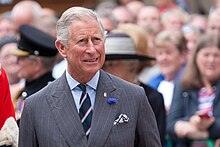Attorney General vetos release of Prince Charles correspondence
Thursday, October 18, 2012
Dominic Grieve, the Attorney General for England and Wales, has vetoed a request under the Freedom of Information Act 2000 to release correspondence sent by Prince Charles to government ministers while Tony Blair was Prime Minister from September 2004 to April 2005.

Image: Dan Marsh.
The decision by the Attorney General overturns a previous decision by the Administrative Appeals Chamber which said there was a public interest in publishing the letters.
In a statement, Grieve made a case for it being in the public interest to not release the documents. He noted that the publication of the Prince's correspondence would damage his preparation for kingship by damaging the public perception that he is "party-political neutral" by showing the Prince disagreeing with the policies of the government. Grieve then stated "[a]ny such perception would be seriously damaging to his role as future Monarch, because if he forfeits his position of political neutrality as heir to the Throne, he cannot easily recover it when he is King".
Grieve's statement did note that the letters from Prince Charles "reflect his personal and deeply held views and convictions" and "are in many cases particularly frank" but notes there is "nothing improper in the nature or content of these letters".
| [the] decision is a serious affront to British democracy | ||
—Graham Smith | ||
The Freedom of Information Act request was made by Rob Evans, a journalist writing for The Guardian. The Guardian stated they intend to take the government to court to challenge Grieve's decision.
Graham Smith from the anti-monarchist group Republic said, "[the] decision is a serious affront to British democracy". Smith argued: "Grieve has said this is about protecting prince Charles’s impartiality, but that impartiality doesn’t exist. Charles has made that clear. This decision is about pretending Charles is impartial while he continues to lobby in favour of his own political agenda. If Grieve believes Charles to be impartial then let him prove it by allowing the release of these documents."
Prince Charles has been criticised in the past for repeated use of his power and influence. The architect Richard Rogers claimed that the Prince, who has strongly traditionalist views on architecture, repeatedly intervened to have projects cancelled which he was working on. Rogers criticised the decision not to release Charles' correspondence: "It is not democratic to cover up his interventions."
Sources
- "Attorney general vetoes Prince Charles letters publication" — BBC News Online, October 16, 2012
- Gordon Rayner. "Prince of Wales letters: letters 'a threat' to Charles as King" — The Telegraph, October 16, 2012
- Rob Evans and Robert Booth. "Attorney general blocks disclosure of Prince Charles letters to ministers" — The Guardian, October 16, 2012
- Mark Beech. "Prince Charles Adversary Richard Rogers Wins Stirling Prize" — Bloomberg, October 17, 2009
- Robert Booth. "Richard Rogers: 'Prince Charles wrecked my Chelsea project'" — The Guardian, June 16, 2009

